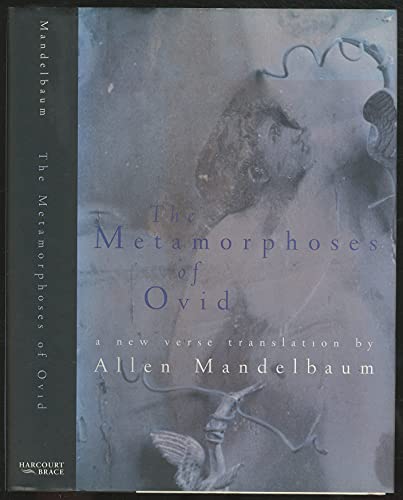Synopsis
A new verse translation of the most famous work of a witty, irreverent Roman poet captures the mischievous spirit of this man of letters who wrote candid poems about love and suffered a death in exile.
Reviews
Mandelbaum, whose translation of The Aeneid won the National Book Award, has rendered Ovid's compilation of classical myths into verse. And the poem is as flowing and metamorphic as the gods and heroes who fill its pages. For example, Book IV tells the story of Bacchus, who was spurned by the daughters of Minyus. They sit weaving and telling stories of the gods, the better to ignore a Bacchic orgy: "Some sisters said such things could never be, / while others were convinced that anything / was in the power of true deities-- / but surely Bacchus was not one of these." When their incredible stories are done, they themselves metamorphose into bats. Mandelbaum's blank verse, which sometimes breaks into rhyme for emphasis or ironic effect as above, is stately without being either precious or dull. It recalls the wit of neoclassical English poetry, as when Envy looks upon the glory of Athens: "it is hard for Envy not to weep, / since there is nothing there that calls for tears." Other passages show a romantic realism; borne off by Jove in the shape of a bull, Europa "turns to glance / back at the shore, so distant now. Her robes / are fluttering--they swell in the sea breeze." The obsession with metamorphosis so evident in Ovid reflects the Greek cosmos, in which chaos and order forever struggle and "discordant concord is the path life needs."
Copyright 1993 Reed Business Information, Inc.
It is staggering how literary developments of the era we call postmodern force us to read Ovid today with a familiarity missing, perhaps, for 2,000 years. Maybe that is why Christoph Ransmayr reframed the master's Metamorphoses a few years ago in his cunning, beautiful, and apocalyptic novel, The Last World (1990). At any rate, we can see now that the techniques of postmodernism have less to do with invention than with a nostalgia for faith and values in an age that forbids them: postmodernism is pretending irony when no irony is felt at all and hoping no one else feels the irony either. So it is that Ovid, in an age when a spot of atheism had begun to touch every thinking person's heart, decided to retell the myths of old. In such an atmosphere, plain telling of the ancient Greek myths would have made him seem a kindly buffoon, so by a series of devices, Ovid draws attention to the act of telling, switching abruptly from hymn to burlesque, forcing events to rhyme, enfolding tales within tales (even interrupting the teller), harping on motifs (like that of doubling), and in short, doing everything he can to let his audience say, "Didn't he tell that part well?"--and so believe and then unbelieve the moment the tale is over. And how could the respectable Augustine believe in these gods who rape, mock chastity, mock marriage, and bumble their way through disaster after disaster? Reading Mandelbaum's extraordinary translation, one imagines Ovid in his darkest moods with the heart of Baudelaire. Lines like these (much more circumspect in Humphries' famous translation) are brutal and black, particularly when they follow so hard on a passage of burlesque: "Then with a veil of heavy fog, the god / concealed a vast expanse of land; Jove stopped / her flight; he raped chaste Io." Mandelbaum's translation is brilliant. It throws off the stiff and mild homogeneity of former translations and exposes the vivid colors of mockery, laughter, and poison woven so beautifully by the master. Mandelbaum is not always the greatest poet, but he is the most extraordinary of translators, and this translation cannot be recommended more highly. We need Ovid. He is our brother. He is our face in the mirror. Stuart Whitwell
Along with Virgil's Aeneid and Horace's Odes and Satires , Ovid's Metamorphoses is a central masterpiece of Augustan Latin poetry. A sort of fantastic epic, it traces the transformation of the world from its origins to the apotheosis of Julius Caesar, narrating the metamorphoses of myriad gods, nymphs, and mortals along the way. As such, it is an important repository of Roman mythology, but it also had a profound influence on subsequent artists and writers. Mandelbaum, whose other translations in the Latin/Italian tradition include standard versions of Virgil, Dante, and Ungaretti, offers a fluid, readable, and accurate rendition of Ovid's elegant and witty verse. A happy contribution both to the student of literature and the lover of mythology.
- T.L. Cooksey, Armstrong State Coll., Savannah, Ga.
Copyright 1993 Reed Business Information, Inc.
"About this title" may belong to another edition of this title.
